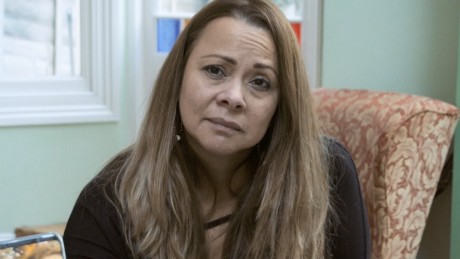


Marc Isaacs: The Filmmaker’s House

”My headline is ordinary people”. Director Marc Isaacs is behind the camera skype-talking with his producer, who gives him the information that the broadcasters of today only want to give money for more commercial/sensational stories. Not ordinary people stories. Isaacs decides to make his film anyway, in his own home. The result is “The Filmmaker’s House” that premieres at the Sheffield Doc Fest in ten days, and later goes to IDFA in Amsterdam, where his film is in the Masters Section together with works of, among others, Viktor Kossakovsky, who years ago in a similar no funding situation made a film not in but from his house, “Tishe!” Don’t give up, don’t take no for an answer, just take your camera” as I heard Portuguese Pedro Costa say the other day.
No more name-dropping. I was happy to see “The Filmmaker’s House” and thought back on the director’s “All White in Barking” that was screened 2009 in Belgrade at the Magnificent7 Festival. Ordinary people. Words by me written for that film on that occasion: “…Multiculturalism and its problems… how do you treat this theme in a documentary. One answer you can find in this film of Marc Isaacs, who has a big respect for all his characters, which does not make him refrain from arguing with them from behind the camera. It is thematically a very important film, charming and funny as it is and about people, neighbours, the ones we never meet. Yes, it is very universal this debate-raising documentary that searches the nuances and goes for solutions, otherwise not present in the media.”
This could be used to describe ”The Filmmaker’s House” as well. Isaacs has the skills to be able to talk to people, to bring the extraordinary out of them. And to frame it in a story that has several layers. I found an interesting article/interview with the director, written by Carmen Gray. Here is a quote:
“Isaacs has been inspired by Algeria-born French philosopher Derrida, who in his writings drew a distinction between conditional hospitality and that of a much more radically open kind.
“Derrida’s Of Hospitality goes back to the Old Testament – the story of Lot offering his daughters to strangers that arrive – and Islam, by which you’re supposed to give three nights of shelter to a stranger without even asking their name, who they are, or why they’ve come,” he (Isaacs, ed.) says. “There is this notion of absolute hospitality, because as soon as you ask somebody their name you have power over them. Of course, it’s related to property ownership. It’s interesting in regard to the homeless figure in my film. Maybe since he doesn’t have a house he’s the one who can offer ultimate hospitality, because he doesn’t have anything to protect.”
So, here is the house where the filmmaker lives. A nice house with a garden. The director behind the camera. There is a woman in the house. She (PHOTO) is from South America, she cleans. She just lost her mother but she does not want to go the funeral. A homeless man passes by. The director knows him, has visited him in the hospital. He asks if he can lie down on the couch for five minutes. The cleaning lady prepares the couch for him. Through the house passes two men, an older overweight and a younger, who assists him to take down high fences in the garden of the house to be replaced by lower ones that give a much more open look to the neighbour, a covered muslim woman, who enters the filmmaker’s house with lovely homemade food to offer to the two fence-workers, the cleaning lady, the homeless man who turns out to be from Bratislava, and the director, Jewish. She is not going to eat because of ramadan.
And things happen – the cleaning lady washes the feet of the homeless, who is also taken to have a bath, the big man doing the fence unpacks his huge sandwich, no thank you to what the muslim woman had brought, he is a dedicated fan of the football club Arsenal, wears a fan shirt and urges, as the other do, the homeless man to call his mother in Bratislava. He also tries to convince the cleaning lady to go to her mother’s funeral.
A lot happens, see for yourself – no spoilers – it’s about helping each other. Can we? Even if we want to? Sounds like a very banal film, it is not, it develops, it surprises, there are twists and turns, the filmmaker is there and is offered help from the cleaning lady, who wants him to get rid of tapes from a previous film that brings back memories to him that have been very hard to live with.
Intelligent film, playful, fun to watch, lovely characters, who are who they are – on the stage of the Real and Extraordinary Life.